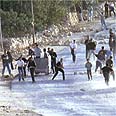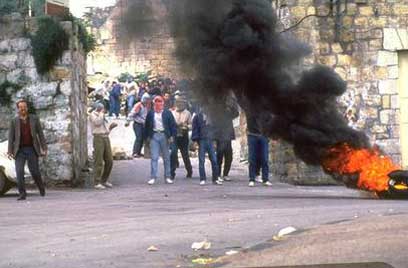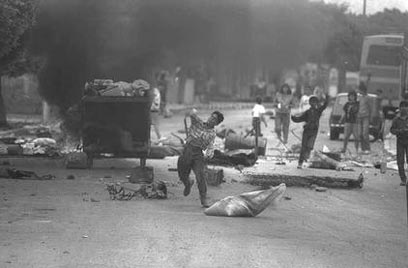
The Intifada, meaning "uprising" in Arabic, is the tern used to refer to the popular uprising among Palestinians in the West Bank and the Gaza Strip against the Israeli presence in these territories, beginning in late 1987 and continuing through to the early 1990s.
Backdrop
It is most commonly believed that the Intifada broke out due to the culmination of several factors, namely the appearance of independent Palestinian leadership, a growing objection to Israeli presence in Gaza and the West Bank; the Israeli settlement movement and a sense of disillusion by the Arab nations' lacking willingness to play and active role in solving the Palestinian problem.
Israel conquered the West Bank and Gaza Strip during the Six Day War, holding power over hundreds of thousands of Palestinians in the process; but unlike its policy concerning Israeli Arabs, the State did not grant the Palestinian Israeli citizenship, placing the territories under military rule instead.

Protest in West Bank city of Ramallah, 1988 (Photo: GPO)
Israel's military rule included funneling considerable funds for the area's infrastructural development while simultaneously using force to suppress any resistance. The Israeli rule made the Palestinian economy nearly completely dependent on its Israeli counterpart.
The decade prior to the Intifada was relatively calm in terms of the Palestinian resistance to Israeli presence in the territories. Those years also saw the settlement movement thrive, antagonizing the Palestinian population in the process. Throughout those years, Israel opposed the Palestinians quest for national self determination and denied their right for one.
From unrest to uprising
The Palestinian unrest escalated between 1984 and 1987, as sporadic rallies became mass demonstrations, which eventually turned into violent clashes with Israeli security forces. The milestone event believed to mark the official beginning of the Intifada occurred on December 8, 1987, when an Israeli truck driver accidentally crashed into a car carrying Palestinian passengers, killing four and injuring seven. The Gaza rumor mill quickly turned the tragic incident into a deliberate one, bringing about a wave of riots which swept through the Strip and the West Bank, as thousands of Palestinians marched through the streets, blocking roads, stoning Israeli vehicles and clashing with Israeli soldiers.
The defense establishment failed to recognize the situation as perilous, since its operational scenarios did not allow for the possibility of a Palestinian uprising; believing instead that a prudential use of forces was enough to control the population.
The first stages of the Intifada manifested mostly in non-organized protest rallies and strikes. Those gradually turned violent as the protestors went from using clubs to using knives and axes, and from setting tires aflame and throwing stones to hurling Molotov cocktails at IDF forces. Terror attacks soon followed, as Palestinians began carrying out stabbing attacks and using firearms and explosives against Israeli targets.

Riot in West Bank city of Nablus, 1988 (Photo: GPO)
The disorganized protests were now orchestrated by three main groups within Gaza and the West Bank – the Palestine Liberation Organization (PLO), Islamic Jihad and Hamas.
Violence fizzles
The Intifada had a devastating social and financial effect on the Palestinian population. Israel halted nearly all infrastructural investments and the Palestinian industry came to a virtual collapse.
The Palestinian uprising began dying out in 1991, mainly due to the Israeli security forces' operation to thwart it and the lack of any major political accomplishments. The Intifada came to its official end in 1993, with the Oslo Accords, which marked the beginning of the Israeli-Palestinian peace process.
According to defense establishment data the Intifada saw 434,520 violent incidents. Israel suffered 66 military and 157 civilian fatalities; and 4,918 Israeli soldiers and 4,195 civilians were injured in Palestinian attacks.
The Palestinians suffered 808 fatalities and 16,824 casualties in clashes with Israeli security forces. Some 985 Palestinians were killed by their brethren.














